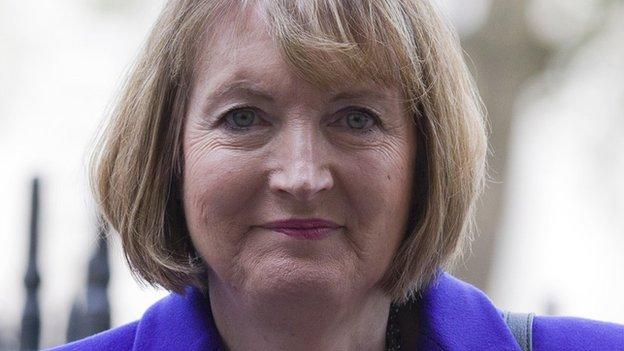Will unions decide the next Labour leader?
- Published
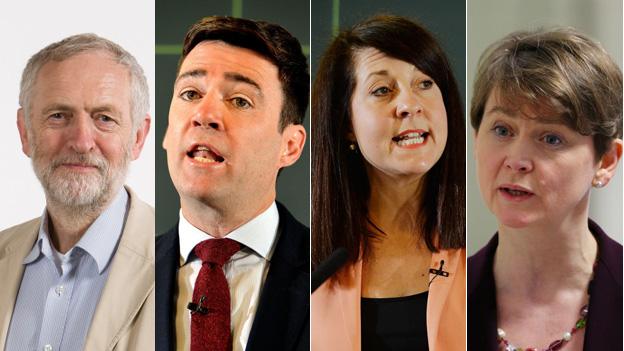
One of these four candidates will succeed Ed Miliband
We know the four candidates who will take part in the Labour leadership contest. But how influential will unions be in deciding who wins?
Autumn 2010 and in the bar of the Radisson Edwardian hotel in Manchester the then general secretary of Unite union, Derek Simpson, and the union's political officer - and former Gordon Brown aide - Charlie Whelan were enjoying a drink and were in excellent spirits.
Just across the road in the city's conference centre it had been confirmed that very afternoon that Ed Miliband had pipped his brother for the Labour leadership.
The giant union had encouraged its members to back the younger Miliband and they were celebrating.
But after a messy row with Unite over the selection of a Labour candidate in Falkirk in 2013, the rules for electing Ed Miliband's successor were changed by the very leader who had most benefitted from them.
Previously, the unions commanded about a third of the vote in Labour's "electoral college" - with ordinary members' votes also counting for a third, and MPs and MEPs the remaining third.
Fast forward to 2015 and the special status of MPs in leadership votes has all but gone.
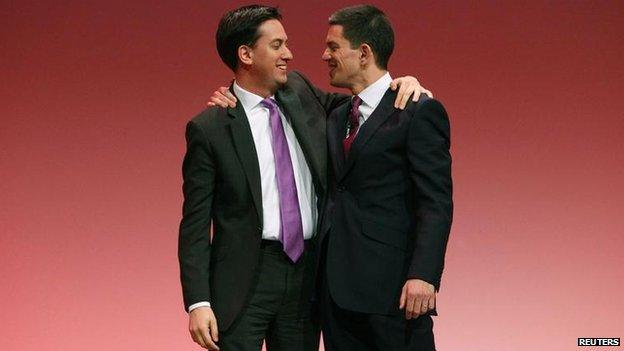
David Miliband (r), who was widely tipped to succeed Gordon Brown, lost out to his sibling
Hopefuls now require the support of 15% of their parliamentary colleagues to take part but when the ballot is held every MP, like every party member - and those who also sign up as registered supporters at a lower rate than the full membership fee - has just one vote each.
The unions' role has changed just as dramatically.
They no longer have a third of the vote guaranteed.
And while in the past any member who paid the political levy had the opportunity automatically to vote for the Labour leader, each member now has to make a positive decision politically and financially to participate in the ballot.
Each trade union member who isn't already in the Labour Party must agree to sign up as an "affiliated supporter" at a cost of £3, which is then handed over by the unions to the party.
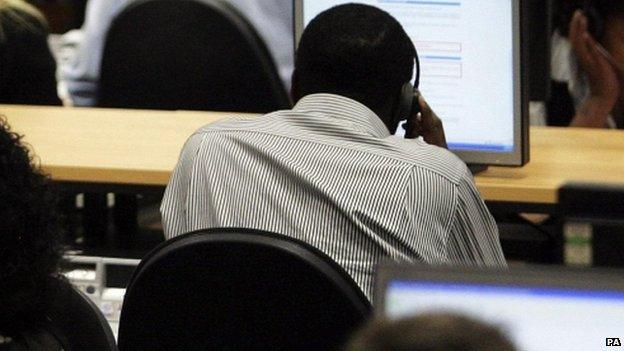
Union members can expect phone calls encouraging them to sign up and vote
To encourage this, unions have set up call centres and printed and distributed the appropriate forms.
The GMB union is using a picture of Lord Mandelson on their leaflet, in the role of a New Labour pantomime villain - suggesting he and his chums will have too much influence unless rank and file union members sign up for a vote.
But how influential will the unions be in determining the outcome?
The GMB general secretary Paul Kenny says his union has signed up just 10,000 affiliated supporters so far.
He has a target of signing up 60,000 - that's still only one in 10 of the membership.
The larger Unite union won't release figures but sources there say they have a similar tally to the GMB.
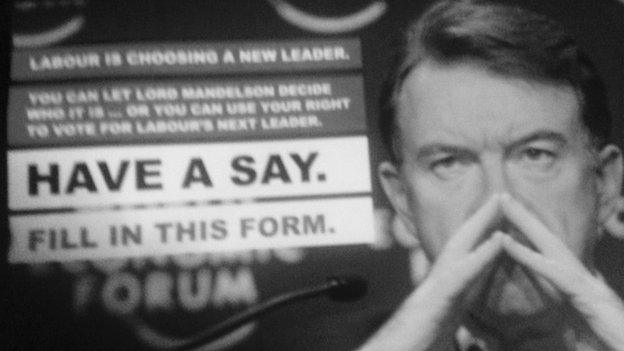
Pantomime villain?
The Labour Party, however, says only 2,750 people have gone through the entire process of becoming affiliated supporters so far, and paid their fee.
The unions' call centres tell members about the new process but officials believe most people will join up after face-to-face approaches by shop stewards.
They admit that outside London - where the Labour vote went up at the general election - it's been more of a challenge to encourage participation.
Overall, the unions have a target of signing up 200-250,000 affiliated supporters.
That would give them rough parity in the leadership contest with fully paid-up members of the Labour Party - currently standing at 243,000 and 4,000 registered supporters - but it wouldn't allow them to dominate the process.
But this target may be ambitious, as only 250,000 union members took part last time when they didn't have to go through the hoop of consenting to cough up cash for the privilege.
But it's also misleading to assume that these new affiliated supporters would necessarily follow the lead of their union bosses in any case.
First of all, ballot papers will be sent out by the Electoral Reform Society not the trade unions.
Union leaders won't be able to send out literature for just one candidate along with the ballot paper.
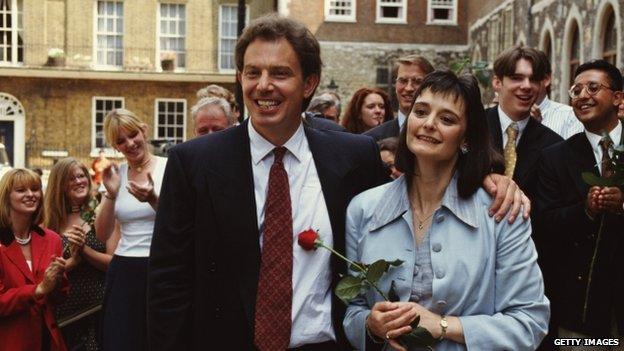
Tony Blair became Labour leader in 1994 despite the GMB urging members not to vote for him
The GMB and Unite were both accused of doing this in 2010 for Ed Miliband. GMB sources concede there was some Ed literature "in the overall wrapping".
Second, even under the old system recommendations weren't always followed.
So, for example, the GMB hierarchy 20 years ago urged members not to elect Tony Blair as leader - and were firmly ignored.
And far more recently - last year in Scotland - the Unite leadership urged a vote for left-wing MSP Neil Findlay. The members preferred the better-known Blairite MP Jim Murphy.
And the most Blairite of the Labour leadership candidates, Liz Kendall, approves of the new system which she believes diminishes the role of union general secretaries.
It's not clear how many unions will make any recommendations to their members this time. Some will hold off until after a hustings, to be organised by TULO - the umbrella body for unions that have a financial link with Labour towards the end of next month.
But even in the unlikely event that all of them backed, say, Andy Burnham - who has been close to public service unions - or the more left-wing Jeremy Corbyn, then that's no guarantee of success.
- Published12 September 2015
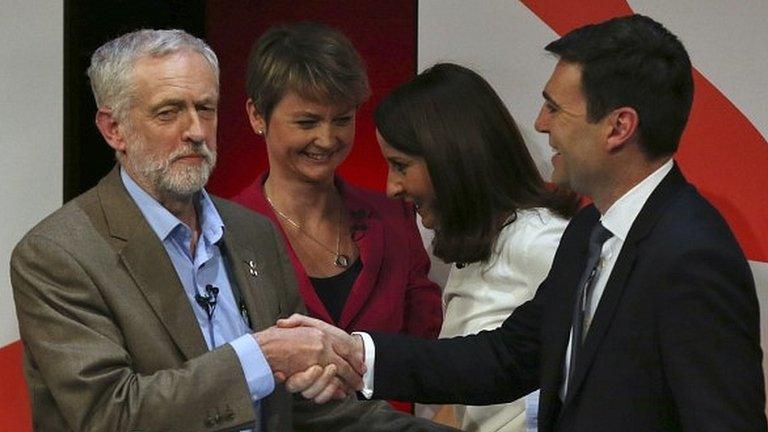
- Published9 June 2015
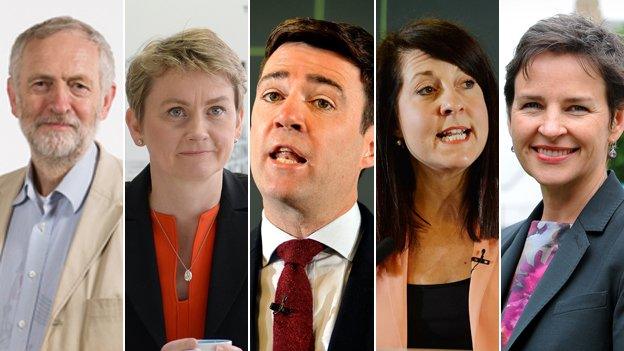
- Published30 May 2015
